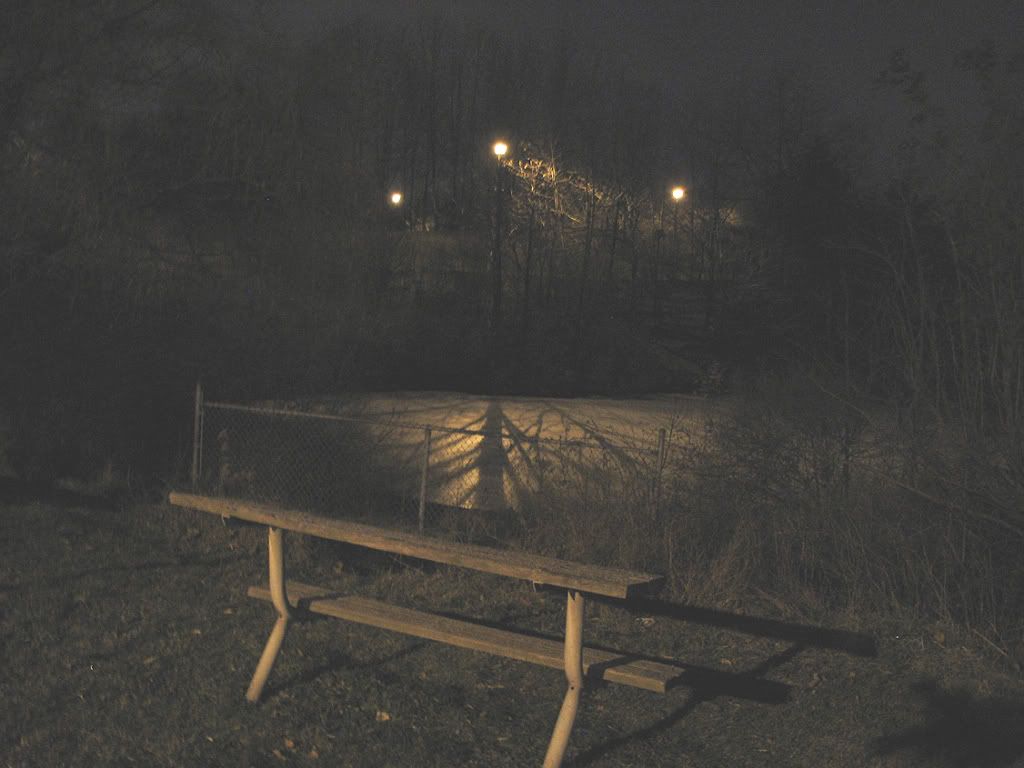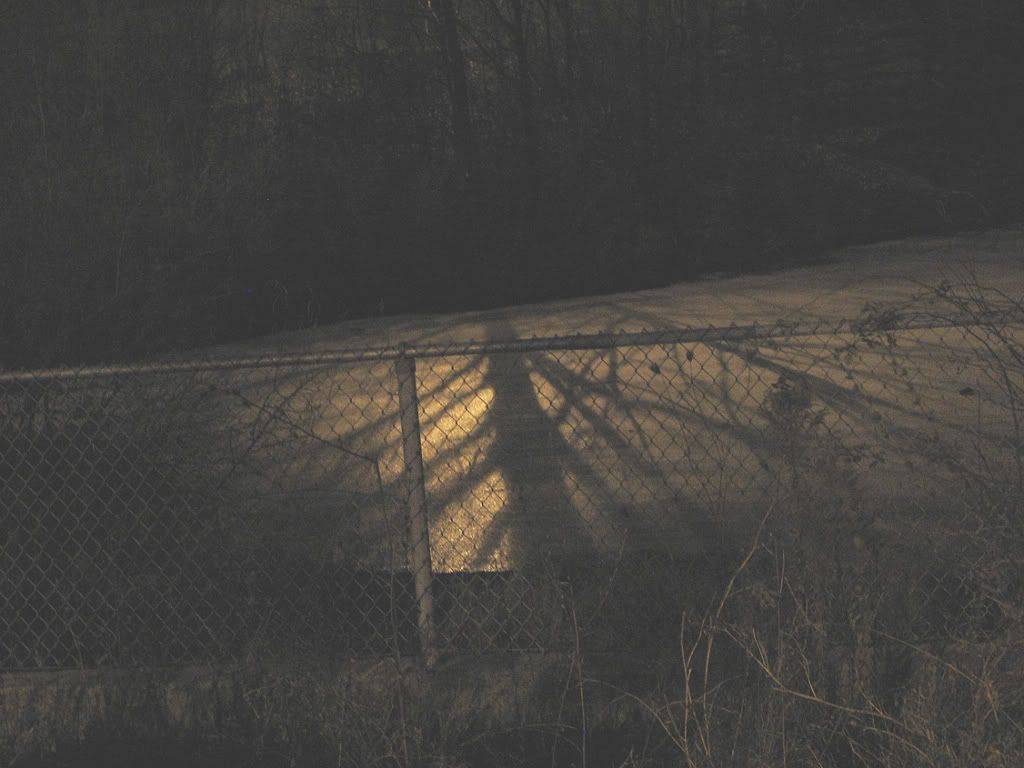 When my son, Jeffrey visited this past weekend, he brought his latest amusing gadget - a powerful green laser pointer. Its beam is far more intense than the standard red lasers we typically use to torment our cats, by convincing them that a big red bug has invaded their territory.
When my son, Jeffrey visited this past weekend, he brought his latest amusing gadget - a powerful green laser pointer. Its beam is far more intense than the standard red lasers we typically use to torment our cats, by convincing them that a big red bug has invaded their territory.While dinner was simmering, we headed out to the park path which surrounds the lake, so that he could show me the distance and brightness its beam could project. It was quite impressive. He shone it on trees, the roofs of nearby apartments and directly into the sky, all the time taking care not to intrude on anyone's space, through a window, a passing plane or any number of canine or human passersby.
Some of the areas along the pathway are unlit due to failing lamp posts or broken light bulbs. When we got to a particularly dark area along the path, we figured that it was as good as any place to shine the laser. There were town homes directly across the lake from where we stood, so Jeffrey held the gadget below their level, and its vivid green light cut a searing path across the void, a few feet above the water's surface. Instantly, we heard what sounded like dozens of duck wings and agitated quacks, announcing their quick departure. Jeffrey and I looked at each other with stunned expressions and stifled laughter. We were both chagrined, yet amused at this unexpected flurry of activity. The remaining angry ducks continued to complain loudly as we made our way apologetically around the pond to return home. Each time one of us spoke, a chorus of quacks scolded us, and a few more ducks flew to another part of the water.
A couple of days later, all had been forgiven and forgotten. While I was out walking, a small cluster of unconcerned ducks waddled along the path ahead of me, nibbling on fallen apples, berries and other morsels which waterfowl find appealing. It was good to see them foraging for their own healthy meals rather than waiting for the usual tidbits of nutritionally-sparse bread that good-intentioned people throw their way.
We were guilty of that crime ourselves, for a while last year. It was a cold and particularly snowy winter, and between Frank's place and mine, there were about a hundred ducks which gathered in our respective ponds. The perpetual motion of their busy, webbed feet kept a significant area of each pond from freezing over, rendering it accommodating for most of the season, enticing them to stay the winter. But they had to be hungry.
One morning Frank brought some leftover bread to them. He tore it to bits while Benny waited eagerly for a dropped tidbit. The next day, Frank and Benny arrived to the sounds of their insistent clamour. Soon, he began to realize that plain, white bread might not be adequate nutrition for the fowl, so he began talking to grocery store managers, asking them to sell him day-old bread which contained whole grains. He went to some daily expense, tearing up a slightly-discounted loaf of bread for these now-demanding ducks. He did the same when we visited the birds in my own local pond. It did occur to us once or twice, that along with this new expense, we might not be allowing the now-complacent birds to scrounge around for their own food. We figured that we'd cease feeding them as soon as spring came along, when their options would be better. It never dawned on us that we might be doing them a large disservice.
While chatting with a neighbour one day, she discussed how frustrated she felt with those who feed the ducks because, they were killing them with kindness. Gulp! I didn't confess our regular feedings to her, but decided to do a bit of investigating. I opened the Holy Google, and turned to pages that I knew were reputable. I found the best summary of information here at Hamilton Conservation Authority. There is similar data to be found at Ducks Unlimited, Live Ducks and Hinterland Who's Who.
Essentially, bread can give them a false sense of satiation, keeping them from looking for healthier foods and causing them to fall ill easily. It can cause them to be too dependent upon us so that they no longer seek out food for themselves. It might discourage them from migrating, which could make them more susceptible to bad weather, and possible in-breeding, which in turn will weaken the flock. It can make the flock more aggressive toward one another, causing stress for some birds. It can also lead them to become more aggressive toward humans. Feeding bread to the ducks can be bad for the ducks, the water, the surrounding area and ourselves.
We were quite surprised and abashed to learn that our good intentions were actually doing harm. So, if you're like us, and have brought a bag of stale bread to share with the ducks and geese for as long as you can remember, please think about what it's doing to these wonderful birds. Instead, educate yourself about what occasional treats you should offer your particular local flocks when the weather is excessively bad, and please refrain from just feeding them as a matter of course.
And I'll do my share by not scaring the feathers off of the ducks with an inadvertent, poorly-aimed laser pointer.
Below are a few photos taken over the weekend. Please remember to click on each one to enlarge them.
 Here's the laser beam as it stabs its way through the darkened room, and bathes the wall above the piano with an eerie, green light. (please click to enlarge)
Here's the laser beam as it stabs its way through the darkened room, and bathes the wall above the piano with an eerie, green light. (please click to enlarge) Early in the day, this Downy Woodpecker came looking for insects among the branches of my plum tree. I guess pickings were still pretty good because it stayed around for much of the hour. (please click to enlarge)
Early in the day, this Downy Woodpecker came looking for insects among the branches of my plum tree. I guess pickings were still pretty good because it stayed around for much of the hour. (please click to enlarge) This curious, little face watched Benny and Skitty from the safety of a high branch, and a closed glass door. (please click to enlarge)
This curious, little face watched Benny and Skitty from the safety of a high branch, and a closed glass door. (please click to enlarge) A walk around the lake reveals an interesting mix of winter white, autumn red and summer green. The lake was still frozen over from the earlier cold snap, but some of autumn's leftovers were also apparent, along with the still-green grass. A little beyond the inner curve of the ice, you can see a plastic coke bottle on the surface, and the two ducks appear to be swimming toward a blue and white ball. Our area not immune to litterbugs. (please click to enlarge)
A walk around the lake reveals an interesting mix of winter white, autumn red and summer green. The lake was still frozen over from the earlier cold snap, but some of autumn's leftovers were also apparent, along with the still-green grass. A little beyond the inner curve of the ice, you can see a plastic coke bottle on the surface, and the two ducks appear to be swimming toward a blue and white ball. Our area not immune to litterbugs. (please click to enlarge) Continuing around the lake, this tree appears to have the face of gazelle - or something. Can you see it? (please click to enlarge)
Continuing around the lake, this tree appears to have the face of gazelle - or something. Can you see it? (please click to enlarge) Nearby this thatch of colour is proof that the recent snow and cold weather didn't kill off every bit of autumn's glory. (please click to enlarge)
Nearby this thatch of colour is proof that the recent snow and cold weather didn't kill off every bit of autumn's glory. (please click to enlarge) This boardwalk overlooks the lake. Towering over it, is a beautiful weeping willow as evidenced by it's leaves strewn across the wooden path. (please click to enlarge)
This boardwalk overlooks the lake. Towering over it, is a beautiful weeping willow as evidenced by it's leaves strewn across the wooden path. (please click to enlarge) Some of those leaves fell onto the thin, icy surface of the lake, and scattered around this log. (please click to enlarge)
Some of those leaves fell onto the thin, icy surface of the lake, and scattered around this log. (please click to enlarge) An after-dark walk reveals icy shadows on the lake. The lamp behind the trees on the path casts its light through the branches and onto the lake's frozen surface, keeping watch over the lake. (please click to enlarge)
An after-dark walk reveals icy shadows on the lake. The lamp behind the trees on the path casts its light through the branches and onto the lake's frozen surface, keeping watch over the lake. (please click to enlarge) Here's a bit of a closer look of the Guardian of the Lake. (please click to enlarge)
Here's a bit of a closer look of the Guardian of the Lake. (please click to enlarge)